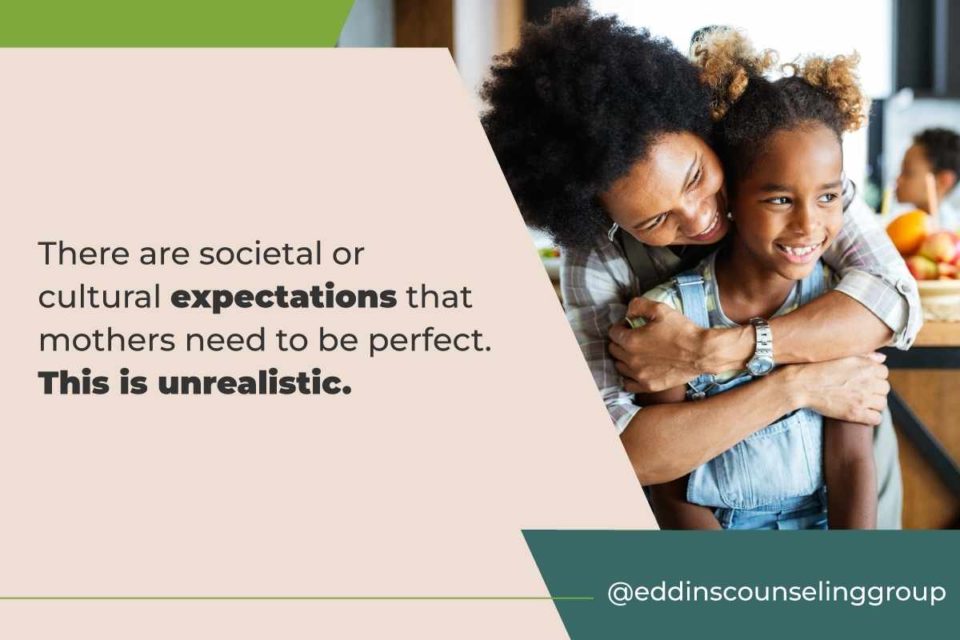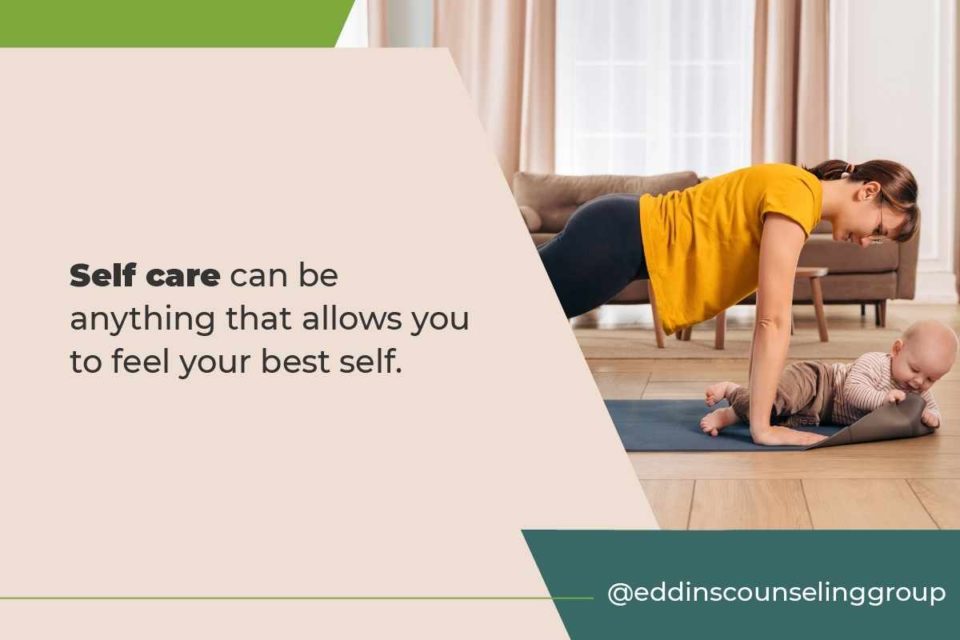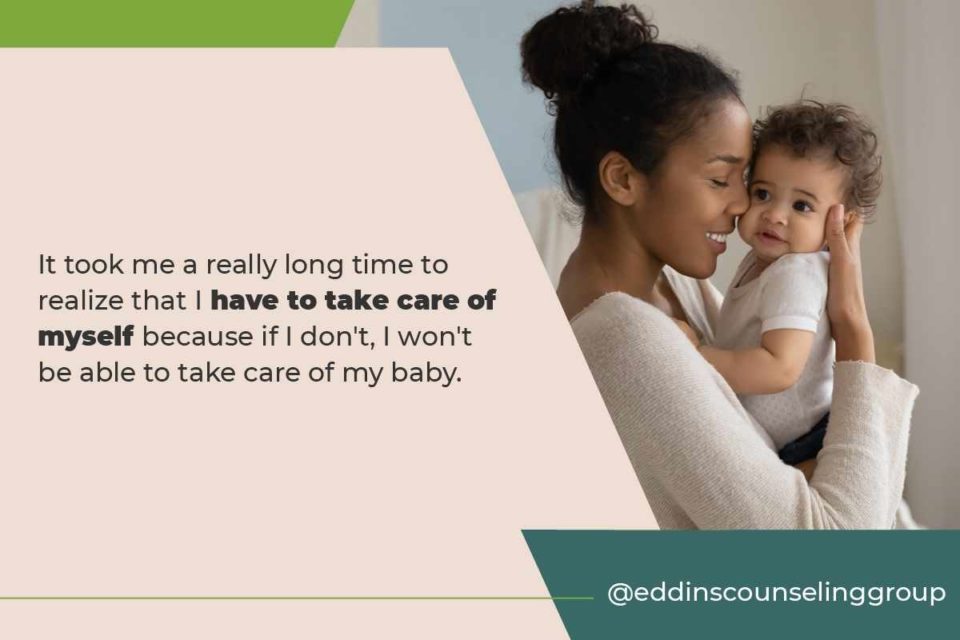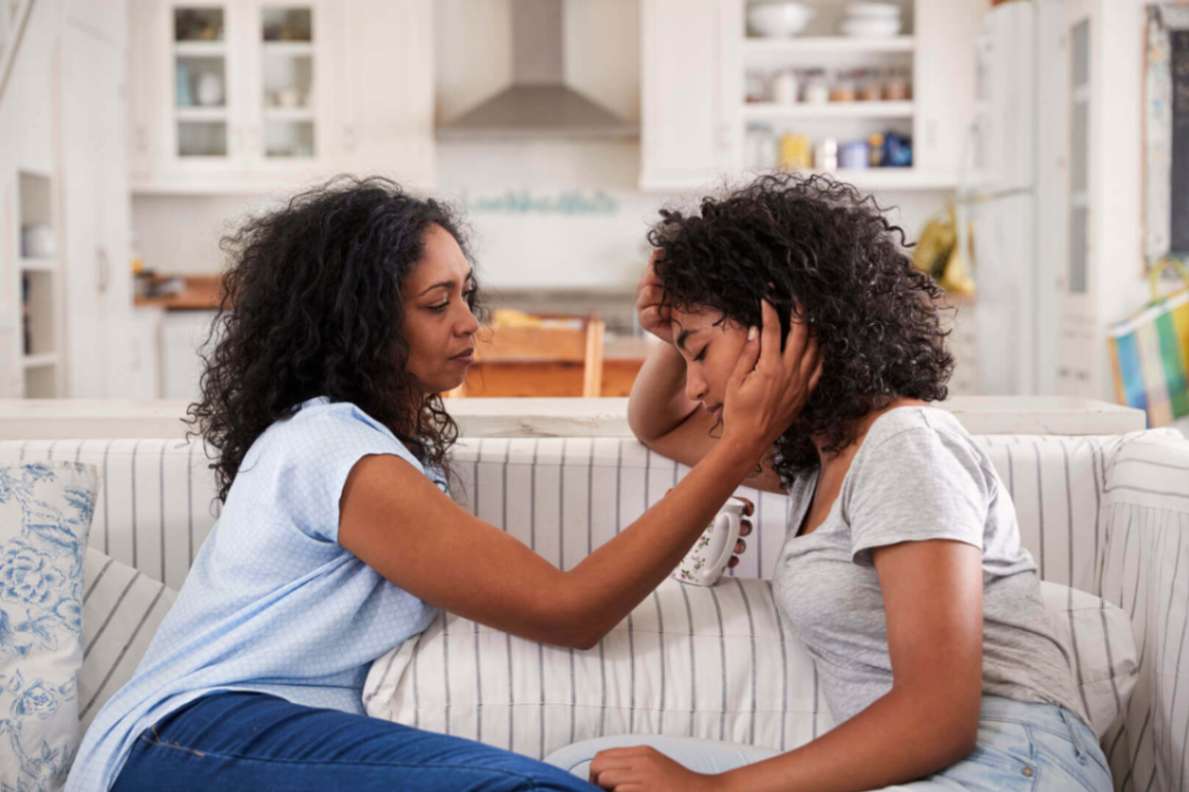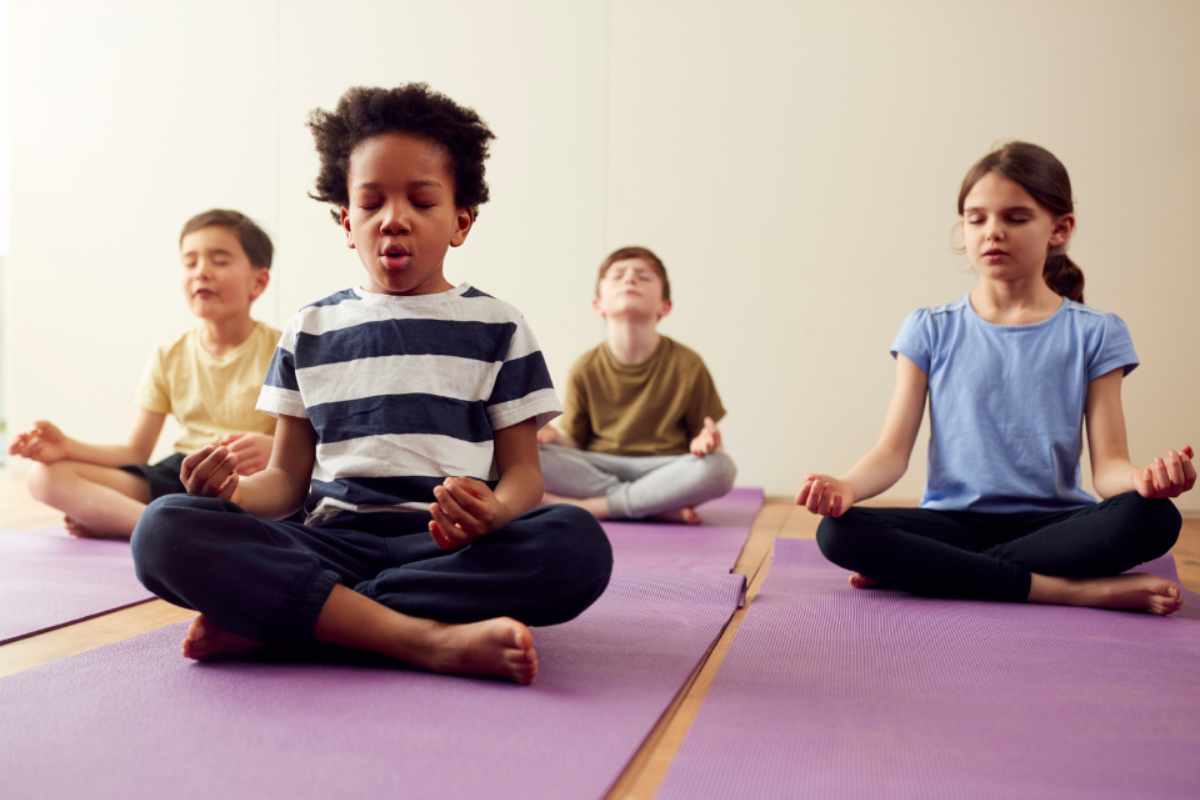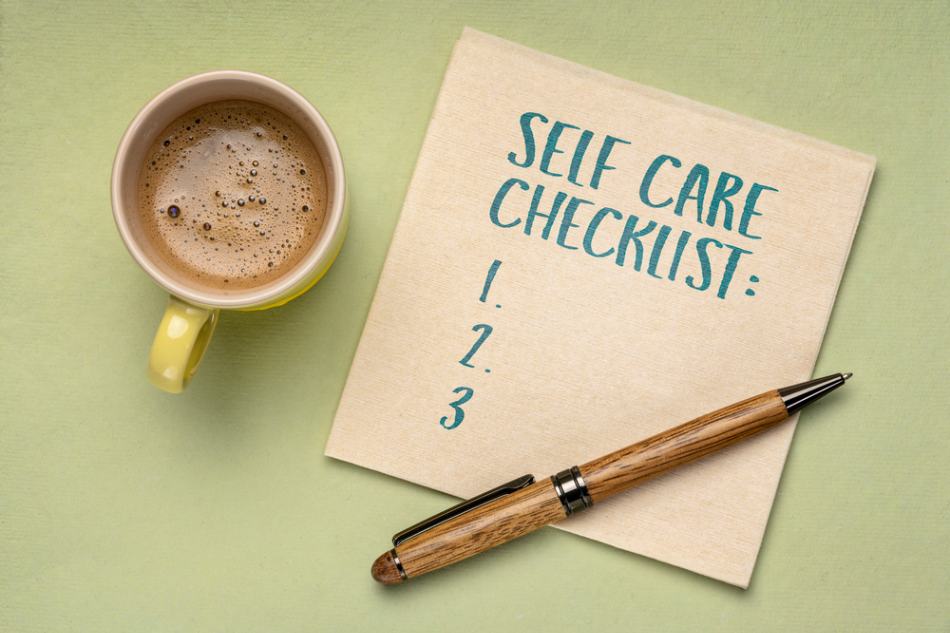May 12, 2022
Webinar: Mothers Matter: Postpartum Wellness
Written by Rachel Eddins
Posted in Parenting & Family, Webinars and with tags: depression, motherhood, postpartum
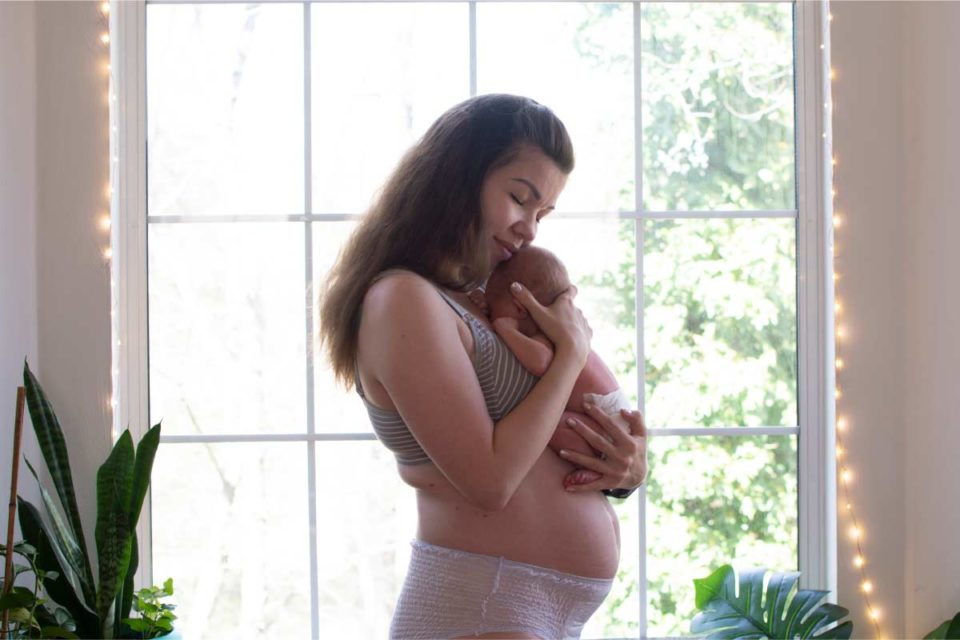
The months after having a baby are full of stress, uncertainty, and many changes both physically and emotionally. This webinar will assist in understanding the difference between baby blues and postpartum depression or anxiety.
Facilitated by Mariela Lara, an LMSW associate, a counselor in training under the supervision of Diana Cabrera-Stewart, LPC-S, CCTP.
Watch a replay of the presentation here.
Learn more about our Postpartum Therapy Services.
Here is a transcript of the webinar:
Good evening, everyone. My name is Mariela Lara and I want to thank you all for joining me this evening. This evening’s presentation is called Mother’s Matter: Postpartum Wellness.
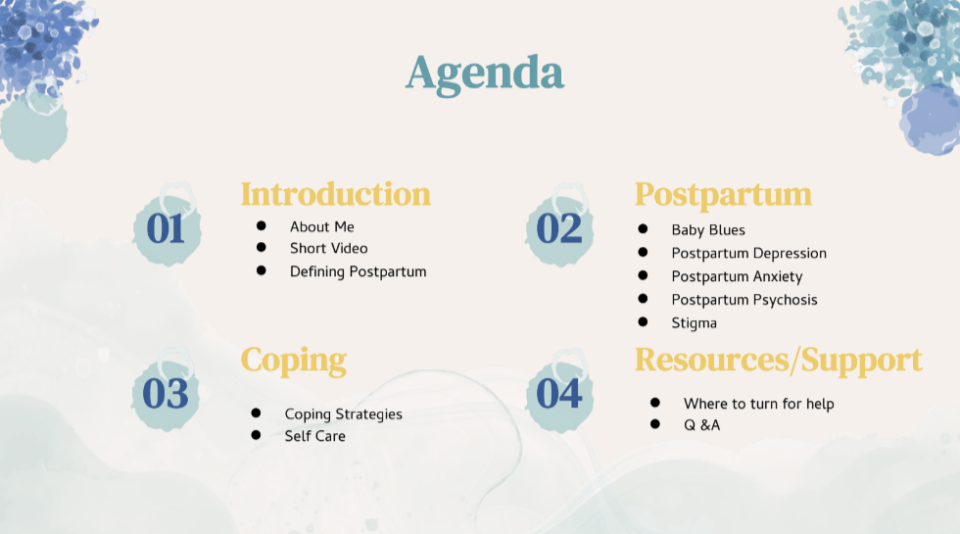
Agenda
A few things before we begin. This is just a simple agenda of everything we’re going to cover this evening:
- A short introduction video of myself,
- The definition of postpartum and a review of the postpartum period,
- An outline of the different things that you can experience during this postpartum time.
Then we’re going to move into coping strategies and self-care. Finally, I’m going to discuss various resources of support and we’ll end with a short Q and A.
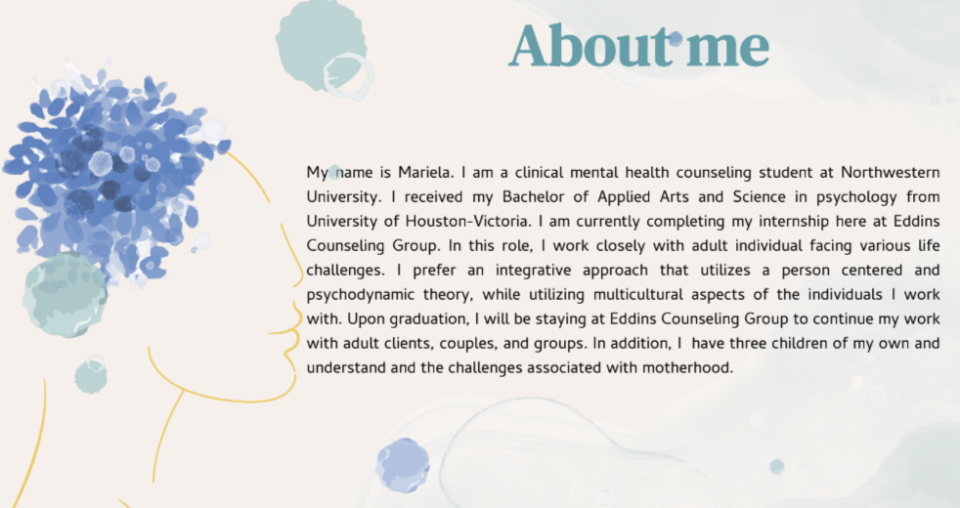
About Me
Let’s start with a short introduction. My name is Mariela. I received my Bachelor of Applied Arts and Science and Psychology from the University of Houston, Victoria. I’m now a Licensed Profession Counselor-Associate under the supervision of Diana Cabrera-Stewart.
In this role, I work closely with adult individuals facing various life challenges. I do work a lot with mothers in various stages of motherhood.
I prefer an integrative approach that utilizes the person-centered and psychodynamic theory while utilizing the multicultural aspects of the individuals I work with.
I have three children of my own, so I understand the challenges associated with motherhood and everything that comes along with it.
The Other Side of Motherhood
I want to start off with a short video called “The Other Side of Motherhood”. This video talks about postpartum depression specifically, but it gives a really great insight into the different changes that one person can experience when you become a mother for the first time.
“We were excited when we found out that I was pregnant with our first child. I remember the nurses talking to us, saying, okay, it’s time you’re going to have your baby. My husband was holding one leg, the nurse was holding the other leg, and then all of a sudden, this baby slid out. “Okay, you’re here. Now what?”
Soon I would find out about the Other Side of Motherhood. They said breastfeeding is the best, and I really wanted to breastfeed him. I was having problems. I thought I was doing it right, but he wasn’t latching. Everything just hurts. And I felt like another failure because a mom should be able to breastfeed. And the crying was nonstop. I would either cry with him or shout at him, really like this. So much pain, so much thinking: “Is this even worth it?”
I was slowly becoming a person that I didn’t recognize anymore. I think of ways how I can leave a note. The relationship that I had with my husband wasn’t the same. It was more of me demanding him to do something and he just has to do it.
I barely remember he was washing dishes, I was talking to him, and then he just stopped, went to the bathroom, and cried. I have never seen him cry before. He said to me: ” I’m doing my best and this is just too much. I don’t know how much of this I can make”. When he said that, I was like:
“No, you cannot break down. I’m already breaking down. If you break down, what’s going to happen to us?” And he said: “I think we need to seek help”.
I remember having to Google depression after birth. What is this? And then postpartum depression. Okay, there’s a term. I was strangely surprised that there were more than two people in the group. When the mothers started sharing their stories, how they were bonding with their newborn, how they were having a hard time. And I remember I was just crying the entire time.
I couldn’t believe there are people who feel the same way. You don’t have to be alone in that because for the longest time I thought it was only me. There’s something wrong with me because I have my baby now.
I knew that I cannot do this on my own. With the right support group, the right kind of people, and the right kind of information, it does really help.
There was a switch in how we approach parenting, and how we were trying to understand our kids. And from then on, I bonded more with him. I had to learn that there’s not only one way of being a mother and to really stop comparing myself with other mothers. Especially now with social media, it just creates wrong expectations.
It took me a really long time to realize that I have to take care of myself because if I don’t do it, I won’t be able to take care of my baby. I won’t be able to have the kind of relationship I want to have with my husband. When you’re pregnant, everyone talks about the baby.
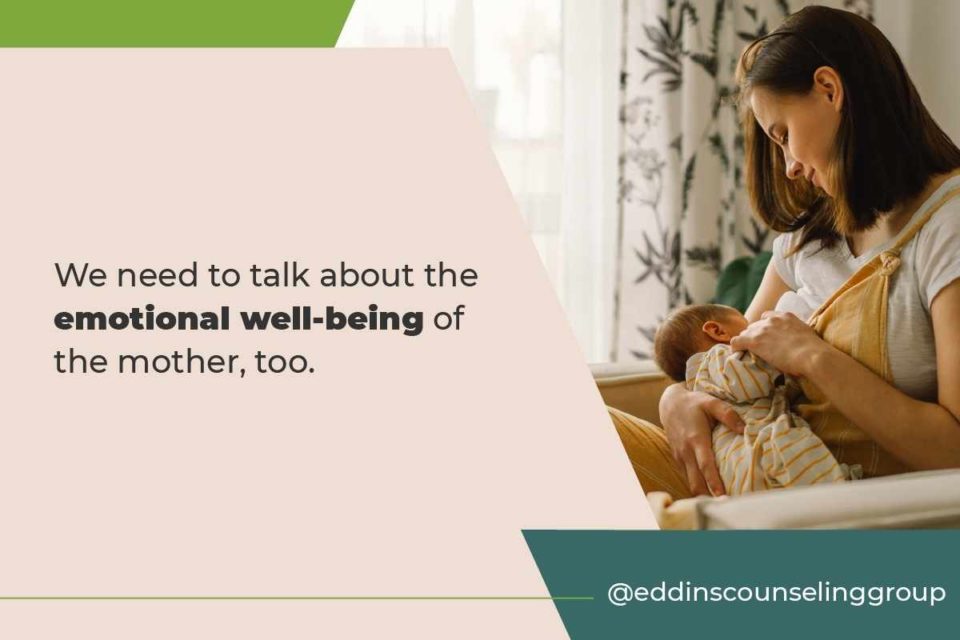
Defining Postpartum
Let’s talk about postpartum. The postpartum period is generally defined as the first year after giving birth. So what can happen during this time? A variety of things, actually.
- First 12 months after giving birth
- Not all women experience postpartum depression specifically
- Others may experience:
- Baby blues,
- Postpartum anxiety,
- Postpartum rage,
- And in rare cases, postpartum psychosis.
Some women don’t feel any of these symptoms and feel perfectly fine, also.
Keep in mind that the postpartum period can look different for each woman, and it doesn’t always look the same for every child we have either. The experiences can differ greatly after each birth.
Postpartum Challenges
Let’s talk about the challenges of the postpartum period and how to tell the difference between what you’re feeling and what you could be experiencing.
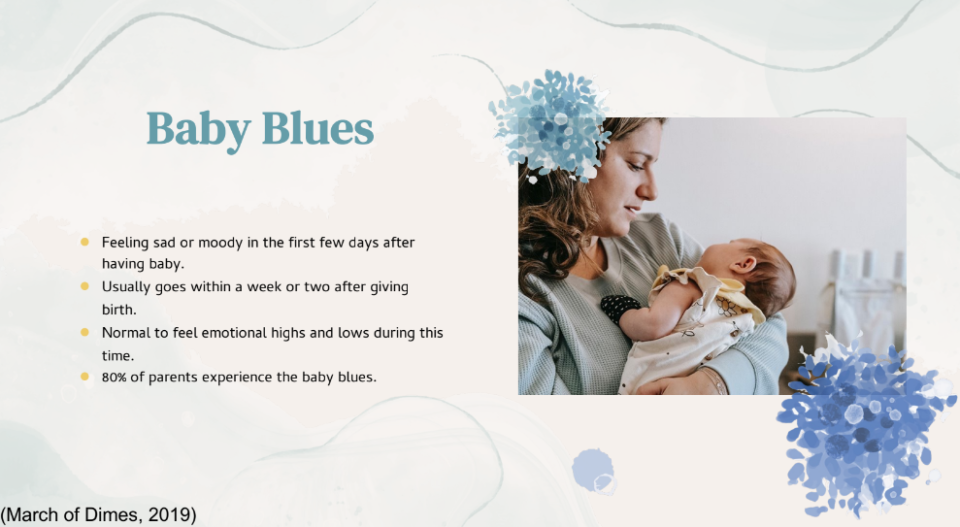
Baby Blues
First, I want to talk about the baby blues. The baby blues are a feeling of sadness that you may have in the first few days after having your baby. Up to four out of five new parents have had baby blues, which is about 80% of new parents. It can affect new parents of any race, age, income, culture, or education level. But having the baby blues doesn’t mean that you did anything wrong or that you’re to blame in any way.
What causes the baby blues?
Hormone changes that happen after birth may cause them. After delivery, the amount of estrogen and progesterone suddenly decreases in your body, causing these mood swings. For some people, the hormone made by the thyroid gland may drop sharply, which can make them feel tired and depressed.
Also, not getting enough sleep and not eating well can also add to these feelings, which can be common, especially when you have a new baby at the house. Emotional issues are another possible cause of baby blues. You may be nervous about taking care of your new baby for the first time.
Are you worried about how your life has changed since the baby was born, or how you’re going to juggle more than one child? All of these things can cause thoughts and feelings of sadness or depression.
Also, you may be more at risk of feeling sad after having your baby if you felt depressed during a different pregnancy or at another time in your life.
Most people experience baby blues two to three days after the baby is born. They can last up to two weeks. They usually go away on their own and you don’t need any treatment. But, if you have sad feelings that last longer than two weeks, the best practice is to tell your healthcare provider. They may want to check you for a more serious condition called postpartum depression.
The symptoms of postpartum depression are similar to baby Blues, but they’re more severe and they last a longer period of time.
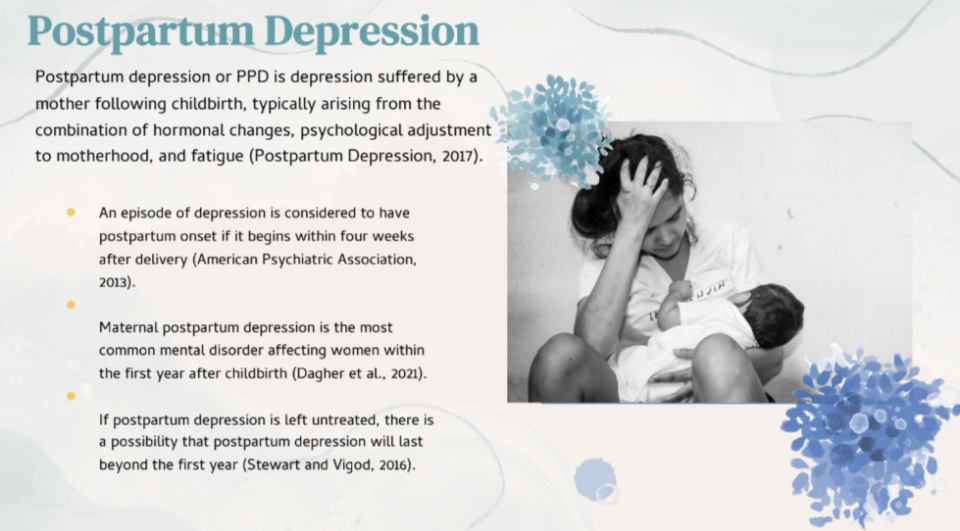
Postpartum Depression
Let’s talk about postpartum depression.
Postpartum depression, also known as PPD, is depression suffered by a mother following childbirth.
Typically arising from the combination of hormonal changes, psychological adjustment to motherhood, and fatigue.
It’s often the most common thing we hear about after a woman has had a baby. An episode of depression is considered to have a postpartum onset if it begins within four weeks after delivery. It is the most common thing that women deal with and are affected by after that first year of childbirth. Also, if postpartum is left untreated, there’s a possibility that the depression will last far beyond that first year.
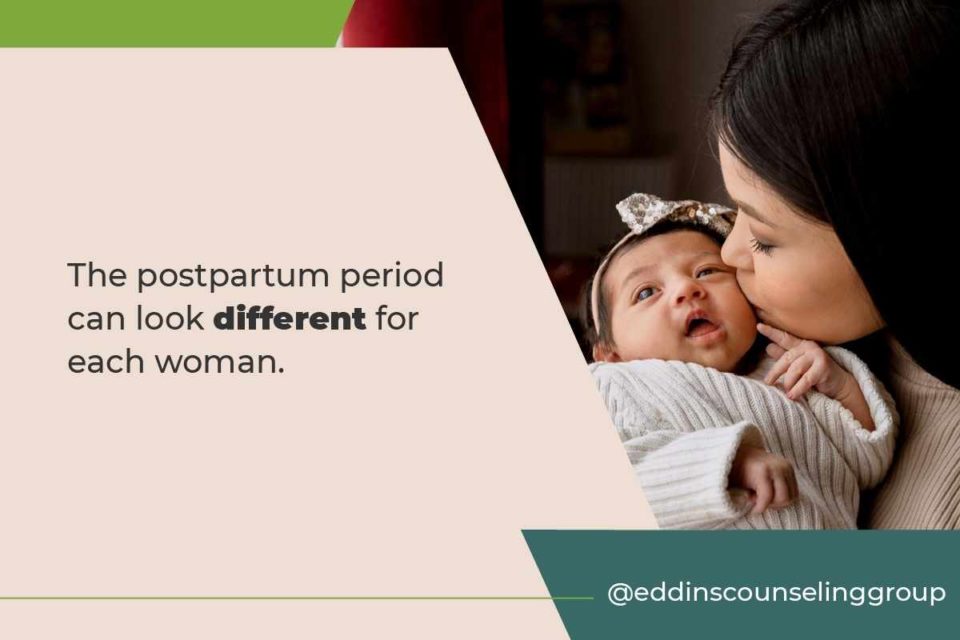
Postpartum Depression Symptoms
Postpartum depression can cause a variety of symptoms. All the symptoms that you see here on the list:
- depressed mood or severe mood swings excessive crying
- just crying for no reason
- a sense of withdrawal from your family and friends so kind of isolating yourself from others
- a sense of hopelessness
- the inability to bond with your baby if you’re feeling lack of attachment
- severe anxiety and panic attacks
- thoughts of harming yourself or baby
Other symptoms of postpartum depression include:
- a loss of appetite or eating more than usual
- inability to sleep or sleep too much
- overwhelming fatigue or loss of energy
- reduced interest and pleasure, and activities you once enjoyed
- intense irritability and anger
- fears of not being a good mother
- feelings of worthlessness
- shame or guilt
- a diminished ability to think clearly
- restlessness
- recurrent thoughts of death or suicide.
It’s also important to note that postpartum depression has the potential to develop in women who have suffered a miscarriage or stillbirth.
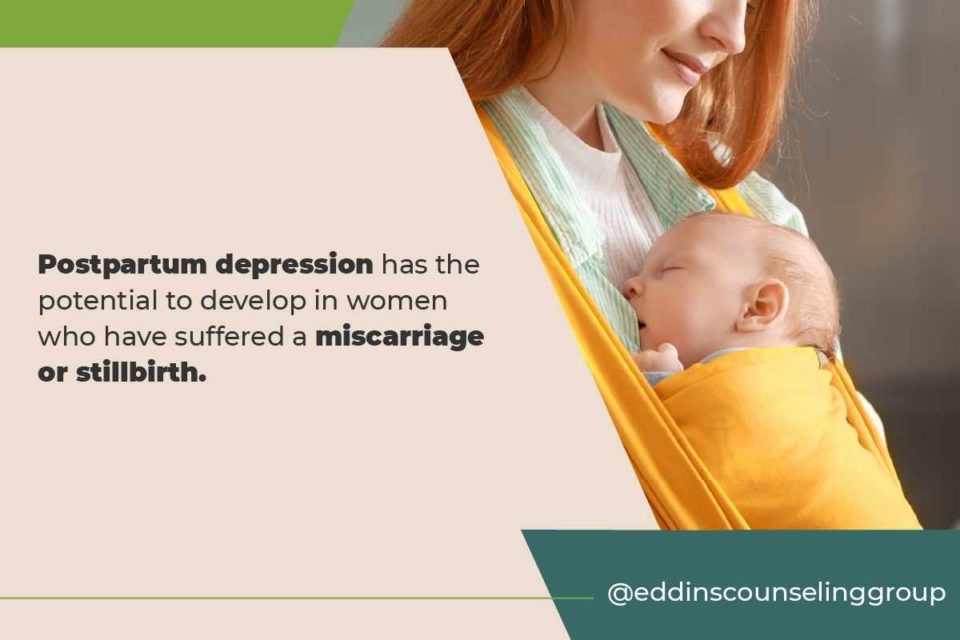
Postpartum
We’ve talked about the baby blues and postpartum depression. Now I want to talk about other things that you can experience in the postpartum period and that’s postpartum anxiety, postpartum rage, and postpartum psychosis.
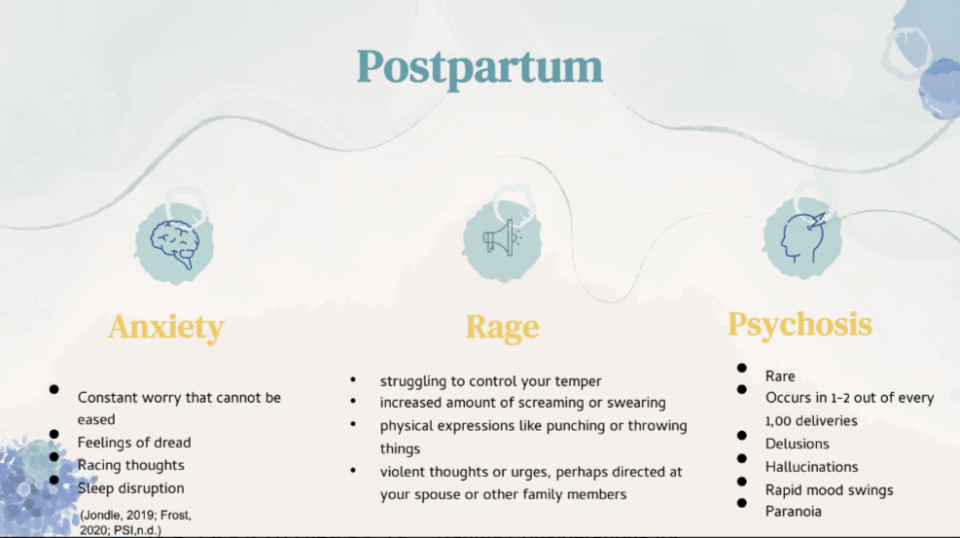
Postpartum Anxiety
Postpartum anxiety is fairly normal but sometimes seems like it’s more and out of control. So keep in mind that most parents experience some worries and that’s normal. But these symptoms are going to feel really exacerbated and elevated.
It’s going to be this constant state of worry that doesn’t feel like it’s eased by anything or feelings of dread, bracing thoughts, sleep disruption, or waking up out of your sleep in a panic.
In addition to these symptoms, you may also experience physical symptoms related to postpartum anxiety, like fatigue, heart palpitations, hyperventilation, sweating, nausea, vomiting, and shaking that you’re not able to control.
So postpartum anxiety can be easily triggered by a new baby, especially if it’s your first. Research indicates that it’s somewhat of a mystery as to what actually causes postpartum anxiety. However, most of the information points back to hormone fluctuations.
So in addition, if you’ve experienced anxiety prior to pregnancy, you’re more at risk to develop postpartum anxiety.
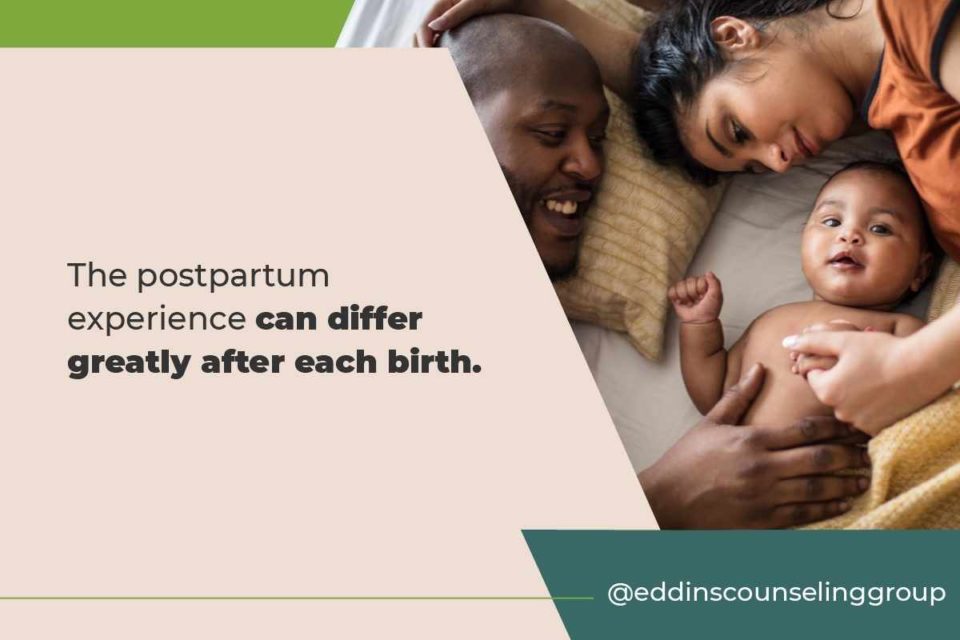
Postpartum Rage
So we’ve discussed baby blues, postpartum depression, and postpartum anxiety, but whatever symptoms reflect more anger than sadness? Some new moms feel mad more often then they feel sad, depressed, or anxious.
For these moms, postpartum rage may be the cause of the intense anger, outburst, and shame in the first year of their baby’s life.
Fortunately, if this describes you, you’re not alone and there are several ways to get better. So, it’s not true that if you are experiencing this, there’s no way you are going to be able to get better.
Postpartum rage differs with each person and can vary substantially based on your own personal situation.
Symptoms of postpartum rage can include:
- struggling to control your temper
- increased amount of screaming or swearing
- physical expressions like punching or throwing things
- violent thoughts or urges perhaps directed at your spouse or their family members
It’s going to feel like everything is fine one minute and then something happens and you’re triggered and you feel this deep sense of anger and rage and you’re throwing something. It’s just something you can’t really control or feel like you have no sense of control over.
There’s not a timeline on how long postpartum rage can last, but contacting your healthcare provider and informing them of your symptoms when they occur is the key to getting the help you need.
Postpartum Psychosis
Postpartum psychosis is rare compared to the rates of postpartum depression or postpartum anxiety. When I say rare, it occurs in approximately one to two out of every 1,000 deliveries.
The symptoms of postpartum psychosis can include:
- delusion
- hallucinations
- rapid mood swings
- paranoia
- difficulty communicating at times
- hyperactivity
The most significant factors of postpartum psychosis are a personal or family history of bipolar disorder or previous psychotic episodes. It’s also important to know that many survivors of postpartum psychosis never experienced delusions containing violent commands. Delusions take many forms and not all of them are destructive.
The majority of women who experience postpartum psychosis do not harm themselves or anyone else. However, there is always a risk of danger because psychosis includes delusional thinking and irrational judgment. This is why women who are experiencing this need to be assessed quickly, treated, and carefully monitored by a trained healthcare perinatal mental health professional.
Postpartum psychosis is temporary and treatable with professional help, but it is an emergency and it is essential that you receive immediate help if you’re experiencing any of these symptoms.
I want to emphasize that we’ve talked about various things that a woman can experience during a postpartum period like baby blues, postpartum anxiety, postpartum rage, postpartum depression, and postpartum psychosis.
It’s important to know that if you have experienced this or you’re experiencing any of this, you’re not at fault and you’re not to blame for any of it.
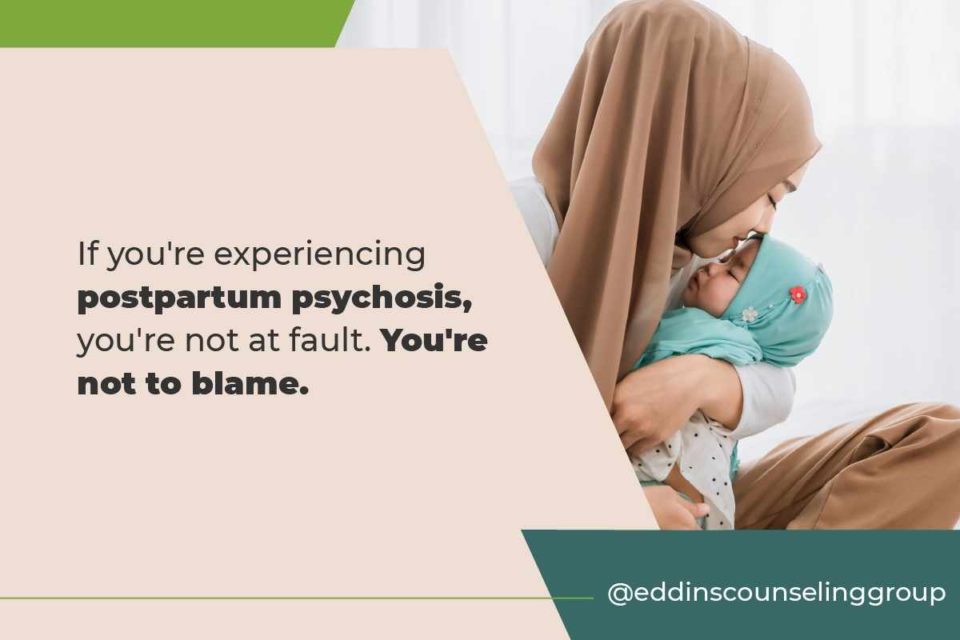
Stigma
There are so many stigmas associated with postpartum mental health and seeking care. I want to emphasize to you that you’re not alone. You do not have to endure this experience alone, and I want to encourage you to ask for help if you are experiencing any of these symptoms we’ve discussed.
900,000 women in the United States experience postpartum depression annually.
What you’re experiencing is nothing to be ashamed of. Oftentimes, there are societal or cultural expectations that mothers need to be perfect or we shouldn’t be sad or need to be strong because we just had a baby. This is unrealistic. Mothers are human too, and that’s perfectly okay.
I want to read you a quote from TV personality Bekah Martinez:
“As a kid, I had a lot of undiagnosed anxiety and obsessive-compulsive issues, but I grew up in a household that stigmatized mental health. I thought that admitting I needed help showed weakness. But I learned from experience that becoming a mom can definitely take a toll on your well-being, especially during the postpartum period. In my case, I started having dark thoughts, obsessing about the dangers of the world and the vulnerability of my own children. All this was compounded by the severe sleep deprivation from having two babies just 16 months apart. It was excruciating and got better only once I became open to therapy.”
I want to emphasize to you that while motherhood is rewarding, it can also be hard. Your experiences are valid, and asking for help is okay. You don’t have to go through this alone.
Coping
So this brings me to coping when you’re having all of these emotions and not really sure what’s going on. You just have this baby and you’re supposed to be happy, but you’re feeling everything that feels the opposite of that.
Coping Strategies
Let’s talk about things we can do that can help you cope with what you’re feeling and experiencing.
Connection with Social Supports
I want to start with social support. Connecting and leaning on social supports is very helpful during this stressful time. Social support is your friends, your family, peers, being with other moms that are in that same experience as you. Don’t be afraid to ask others for what you’re needing, whether it’s help with the baby, cooking dinner, or helping clean the house.
Don’t be afraid to ask for help.
Often, as women, we are conditioned to be able to do it all. So while asking for help may initially feel uncomfortable, you may find that leaning on your social supports can alleviate some of the tension you may be feeling as a new mom.
Calling and talking with other moms you know can help normalize your experiences as well and help you to know that others may have had something similar and have experienced the same things you are.
Lifestyle Changes
Another thing that can help to cope is lifestyle changes. So you’ve probably made various changes during your pregnancy, but there are some changes to consider with being a mother, and they can be helpful if you’re experiencing depression or anxiety.
The first one is healthy lifestyle choices. This includes things like:
- Eating well,
- Getting an adequate amount of rest,
- Getting some physical activity like a walk with your baby,
- Just being outside and getting some sun, including that in your daily routine, and
- Exercising once you’re cleared by your physician to do so. Exercise releases endorphins, which combat stress and can boost your mood.
Also, setting realistic expectations while you’re recovering. You’ve just had this baby. You might have just become a mom for the first time or you may be juggling multiple kids now.
Having these unrealistic expectations, like “I need to finish all of this stuff and keep everything perfect”. The key is to not put this unrealistic pressure on yourself.
Also, make time for yourself. Remember that taking care of your baby includes taking care of yourself. So do something you enjoy, such as crafting, a puzzle, or watching your favorite movie.
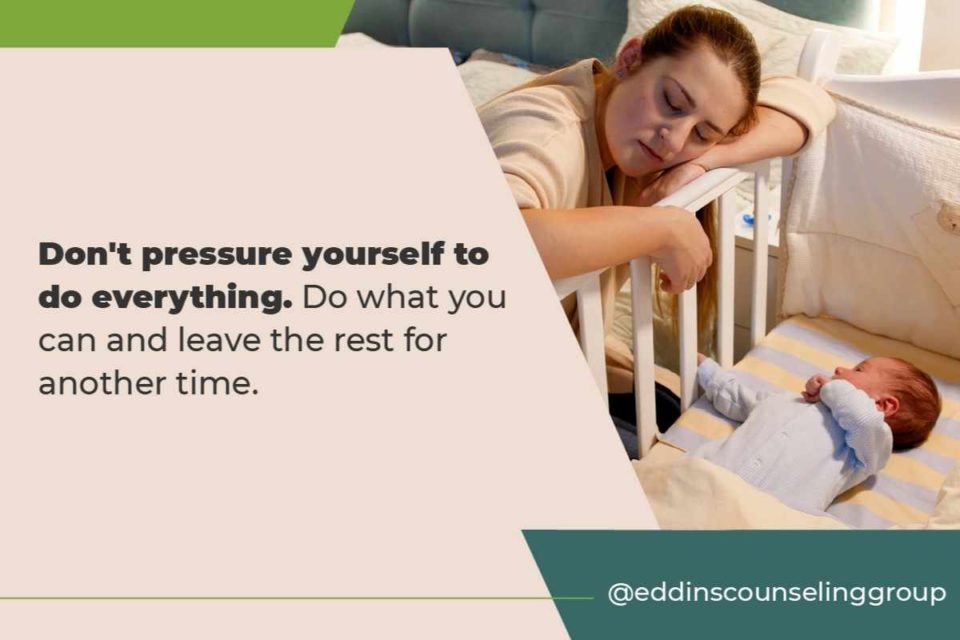
Meditation
The next thing I want to talk about is meditation. So with meditation, you can learn to reduce stress and its added effects on postpartum depression and anxiety. So there are a lot of great options online. Youtube is also a great resource. You can try searching for self-guided meditations or guided meditation, whatever is kind of your preference there. You can do both to see which one you like better.
Some people really enjoy meditation, others don’t. But it’s definitely something that can help reduce that level of stress and really bring you back to a sense of calmness.
Therapy
Therapy is also a valuable option when you’re experiencing hardships during the postpartum period. There are two options available: in person, and virtual options.
Virtual options may be a great option, especially for new moms who find it more difficult to get out of the house for a little bit, even after they’ve had their baby. Group therapy is also a great option because it allows you to share experiences with others who are also going through the same situations as you are.
So again, that social support I talked about, really engaging with others who are going through the same things you are because there’s no better support than somebody who’s actually experiencing the same things that you’re going through.
Medication
The last thing I want to talk about is medication. So medication, typically antidepressants, may be prescribed to help manage postpartum depression or postpartum anxiety symptoms.
Medications are usually used in conjunction with these other treatments that I’ve talked about. It’s important to know that the medication may take a couple of weeks to become fully effective and always consult with your physician.
Self Care
I want to go back to what we’re talking about before as far as making that time for yourself, taking care of yourself. This is where self-care comes into play.
I’m sure we’ve all kind of heard about it, especially with the pandemic and making sure we’re taking care of ourselves. But what exactly is self-care?
Self care is defined as the practice of taking an active role in protecting one’s own well being and happiness, in particular during periods of stress.
So self care does a variety of things. It helps you maintain your sense of self worth. Sometimes as new moms, we forget who we are, so to speak, and feel like we’ve lost ourselves or our identity.
Self care can help you remember that you’re a person in addition to being a mom. Practicing self care sets a good example for our children. It helps model to them the importance of sleeping well, eating right, and taking care of themselves to thrive.
Also, caregiver burnout is a real thing. It can physically make you sick. Getting sick is one thing, but having to be sick while taking care of a baby is extremely difficult. So again, it’s so important to implement that self care to be able to take care of ourselves, to avoid that care for burnout.
Your own self care is essential to maintaining your own health and is also key to your child’s physical and mental well being.
Taking care of you helps take care of your kid. They both go hand in hand.
What does self-care look like?
Let’s look at what self care can look like specifically.
- It can be taking a step back forgiving yourself, or saying no to something you really don’t feel like doing, even if you’ve previously committed to it.
- It can be staying home and watching a movie, setting boundaries that make you feel your best.
- Asking for what you need is also a form of self care, saying to your partner: “Hey, I need you to do the dishes tonight, or I need you to take the baby for 30 minutes so I can go shower and just be by myself for a little bit”.
- Putting yourself first is self care.
- Being alone is self care.
Sometimes as a mom, we get touched out, right? If we’re breastfeeding and we have other children and somebody is always touching us and needing something and constantly wanting and we’re constantly giving. Being alone is also a form of self care and asking for help.
Self care is not limited to this diagram.
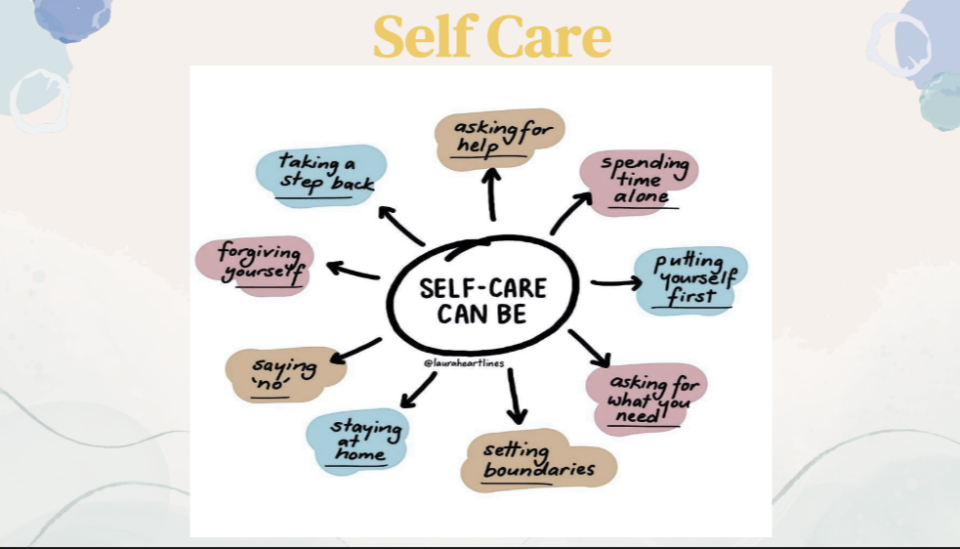
Self care can be anything that allows you to feel your best self.
It can look like anything to you. In addition to this diagram, it can be journaling, going for a bike ride, going for a walk, or anything that makes you feel like you’re taking care of yourself and you’re giving that energy back to yourself.
Resources
I want to talk about the different resources that are available online and out there to you.
Where To Turn for Help:
- Postpartum Support International
- CDC
- Postpartum Depression Org
- March of Dimes
- Texas Health Org
- Eddins Counseling Group
Each of these organizations has a plethora of information on the postpartum period and offers various resources.
Postpartum Support International host a virtual support group. They have information on postpartum care and other things like that. The CDC, Postpartum depression Org also. The March of Dimes has this really cool diagram that has baby blues versus postpartum depression. And it’s laid out in this table so it allows you to cross-check symptoms to be able to see, is this something I’m experiencing, or is it something else that I’m experiencing? So I thought that was really helpful to kind of put it on paper and be able to see. Texashealth.org also has some really great resources.
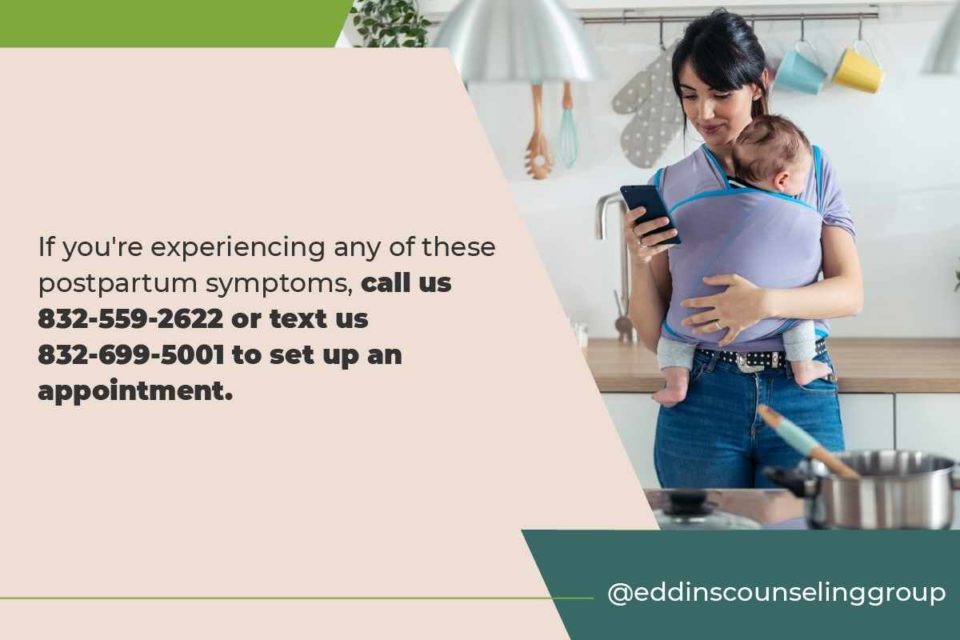
We’re Here to Help
Even our own Eddins Counseling Group website. There are two quiz health quizzes on there. There are the Postpartum Anxiety Quiz and the Postpartum Depression Quiz which could be really helpful if you’re experiencing any of these symptoms.
There’s also a Self Compassion Quiz there that I think could be really beneficial to check in and see if you’re giving yourself that self-compassion that is really needed, especially when you become a new mom.
All of these resources are really great and have some really great things on them. So I’m definitely going to encourage you to check those out and see if you find any of that helpful.
I want to leave you with some helpful reminders from our time together today.
- You don’t have to suffer alone.
- It’s okay to ask for help.
- Perfection is not required.
- Being a mom is hard and it’s okay to ask for help. We all need help every now and then we’re all just learning.
Motherhood is hard, it’s chaotic, and it keeps us busy. That’s why our therapists are available to meet you online and in three convenient locations – Houston Heights, Houston Montrose, and Sugar Land.

